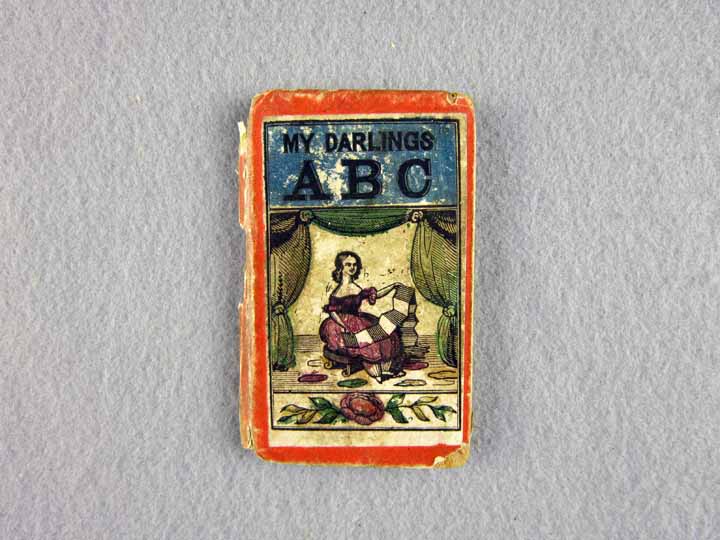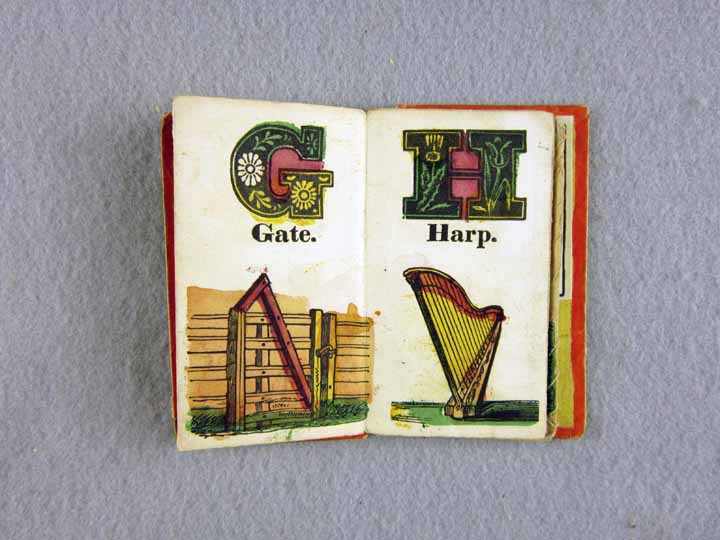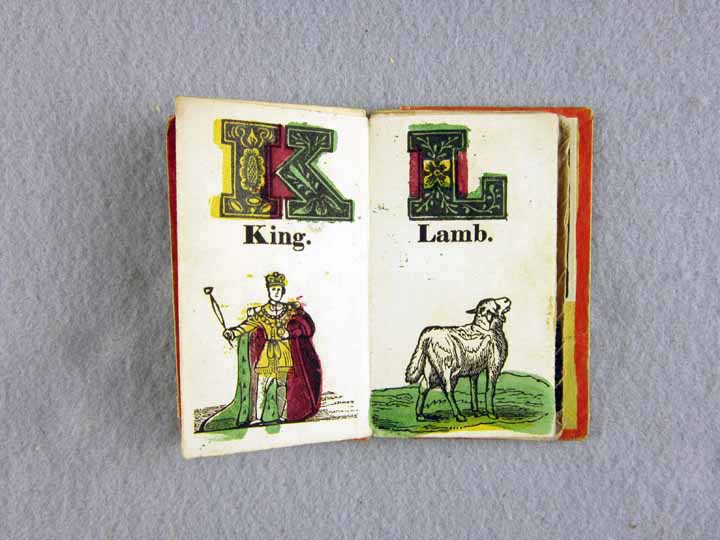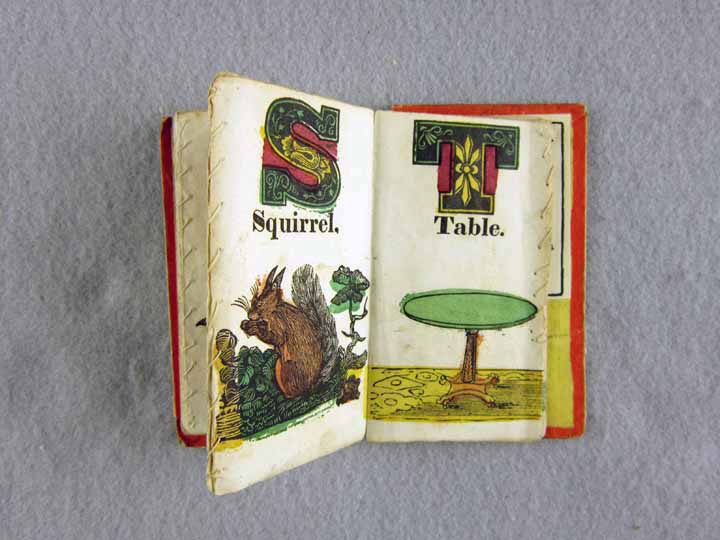

Alphabet books offer a vivid insight into the history of literacy and culture, as well as concepts of childhood. The Children's Book Collection at UCLA contains a rich array of these materials, some well-worn and much-used, some still bright and fresh. Each is a gem of print production and graphical imagery from another time and place. Though the history of alphabet books continues to the present, this exhibit focuses on the works in our collections published between 1700 and 1900, including horn books, primers, works of didacticism and seriousness, whimsy and play.
2. A Jumble ABC
3. A Little Pretty Pocket-Book
4. A New Lottery Book of Birds And Beasts
5. A Pretty Play-Thing for Children of All Denominations
8. ABC of Objects for Home And School
10. ABC with Pictures & Verses
12. Alphabet Et Instruction Pour Les Enfans
16. Dolly's ABC Book
17. Flora's ABC
18. Home ABC
22. Hornbook C. 1700
23. Large Letters for the Little Ones
24. Little ABC Book
25. Little People: An Alphabet
26. Martin's Nursery Battledoor
27. Mother Goose ABC
28. My Darling's ABC
29. Orbis Sensualium Pictus Quadrilinguis
30. People of All Nations: A Useful Toy for Girl Or Boy
31. Picture Alphabet
32. Pretty ABC
33. Railway ABC
34. Rusher's Reading Made Most Easy
38. The Alphabet of Old Friends
40. The Amusing Alphabet for Young Children Beginning To Read
42. The Child's Christian Education
45. The Easter Gift
47. The Favorite Alphabet for the Nursery
49. The Franklin Alphabet And Primer
51. The Golden ABC
55. The Moral And Entertaining Alphabet
57. The Old Testament Alphabet
59. The Picture Alphabet for Little Children
62. The Sunday ABC
63. The Union ABC
64. The Young Child's ABC, Or, First Book
65. Tom Thumb's Alphabet: Picture Baby-Books
67. Warne's Alphabet And Word Book: with Coloured Pictures
68. Wood's Royal Nursery Alphabet
Title My Darling's ABC





Brief description Child-size ABC book, bound accordion style. Each page contains an upper-case letter with corresponding word and image. Hand-stenciled with four colors.
Full description The petite size of My Darling's ABC directly correlates to the size of the intended user. While closed the small book fits into the palm of an adult hand, but when opened the ABCs are seen in unison, and the book spans out over two feet. The cover illustration shows a well-mannered girl reading on a stool framed by curtains, and suggests that this book was made for young girls.
Accordingly, each page of this ABC book contains one letter in simple feminine typography, a one syllable word and an image to illustrate the word. The pages are bound accordion style, and show the wear and tear that comes with great use--several of the pages have been repaired by hand with thread.
Literacy Literacy has long been equated with good behavior, and My Darling's ABC demonstrates the desire for children to be educated and well-mannered from a young age. This ABC book uses a letter/word/image pattern of association to teach the alphabet. New expectations for girls to be literate began to rise around the time when this book was published, which corresponds to the audience of readers intended for My Darling's ABC. The basic alphabetic content of the book shows that the book was meant to be an introduction to the ABC's, and meant to provide the basic building blocks needed for reading and writing. This book demonstrates the concept of literacy by presenting the alphabet two ways. When the book is folded out, the alphabet can be viewed as a whole--as one complete unit it can be understood as an encompassing tool for literacy. Conversely, when the book is folded each page can be viewed independently from the others and individual associations between each letter and image can be learned. The letters can be viewed and learned individually, or the entire alphabet can be viewed at once, which demonstrates that My Darling's ABC was a portable and compact literacy tool.
Childhood The scene on the front cover of My Darling's ABC perfectly reflects how the book was used: framed by curtains, a young doll-like girl sits on top of a small stool concentrating on a small accordion style book. This image illustrates the expectations for children that began to arise around the turn of the 17th century when this book was used, and connects knowledge of alphabet with the idyllic concept of childhood and an assumption of innocence in children that paralleled foundational thought from the Age of Innocence. The girl on the book's cover sits attentively poised and on her best behavior, almost in an adult fashion. My Darling's ABC was produced and used during a time when the concept of childhood was shifting from seeing children as miniature adults to understanding childhood as a distinct period of development.
Iconography Through their complete lack of religious content, the images presented in My Darling's ABC show that the book was a product of the Age of Enlightenment. The words, which feature mostly animals both familiar and exotic--A for Ape, C for Cat, E for Eagle--create connections that both reflect reality and allow use of the imagination. While representing childhood as a time of innocence, the iconography contained by My Darling's ABC demonstrates the implicit assumption that girls ought to learn the alphabet by studying associations between letters and household objects like J for Jug and P for Pump. Along with the ABC's, My Darling's ABC provides a basic introduction to domestic vocabulary for young girls.
Production Although the publisher information for My Darling's ABC is unknown, some important conclusions can be drawn upon examining the book. Clearly, around the year 1800 standards of publishing attribution were not commonplace. Furthermore, the small size of the book--a compact two by three inches--demonstrates that publishers had acknowledged that learning could take place anywhere and books appropriate for children could become more convenient through reflecting the size of the reader. My Darling's ABC represents the fine-tuning of the children's literature publishing industry around the turn of the 18th to 19th century.
Publisher Unknown
Date 1800
UCLA Call Number CBC PE1119.A1 M905 1800
Repository UCLA Charles E. Young Research Library, Dept. of Special Collections
Dimensions 2 in x 3 inp> Technologies of production Stenciling, woodcut (process)
Media and Materials Paper
Caption